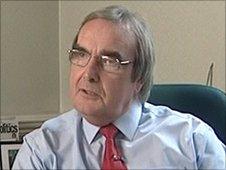Commons motion over Birmingham CCTV cameras
- Published

Mr Godsiff said he would like a "proper debate locally"
A Birmingham MP has called for 200 cameras, which he says are to monitor extremists, not to be activated.
Roger Godsiff, Labour MP for Hall Green, said he was going to raise the issue in the House of Commons.
Cameras have been installed in the inner city areas of Sparkbrook and Washwood Heath with some automatic number plate recognition (ANPR) cameras put up in Kings Heath and Moseley.
The council said the cameras were to detect all crimes, including terrorism.
Mr Godsiff said not telling people where the cameras are was "unacceptable".
Project Champion
Mr Godsiff said he was putting through an early day motion at the House of Commons to ask for the cameras not to be activated.
His motion says: "That this House views with concern the implementation of an initiative, codenamed Project Champion, whose principle function is to monitor extremists that the police and MI5 suspect to be living among the city's Muslim community."
It also says the scheme "constitutes a grave infringement of civil liberties".
Mr Godsiff said: "What I would like is first of all for the police not to activate the cameras [and] secondly for there to be a proper debate locally about whether people want them."
The MP added if people did not want the cameras, they should be removed.
Concerns about the cameras were raised at a meeting held by Safer Birmingham Partnerships for members of the public last week.
Cameras activated
Safer Birmingham Partnerships is a joint partnership between police and the council and other agencies.
A spokeswoman for the project said a small proportion of the cameras had been activated and that this would grow, week by week.
After last week's meeting the partnership issued a statement saying it would be meeting to review the matter.
In an earlier statement, put out in April, the partnership said it had got £3m from the Home Office to improve community safety and crime reduction in the Washwood Heath and Sparkbrook wards.
The funding was for CCTV and ANPR cameras which would play a "significant role" in reducing all types of localised crime and criminal behaviour including burglary, vehicle crime and drug dealing, "right through to terrorism".
The statement also said most cameras were overt and the locations would become known. The location of some covert cameras would not be made public as it would compromise police intelligence.
Sparkbrook and Washwood Heath were chosen as they had high crime rates, the statement said.